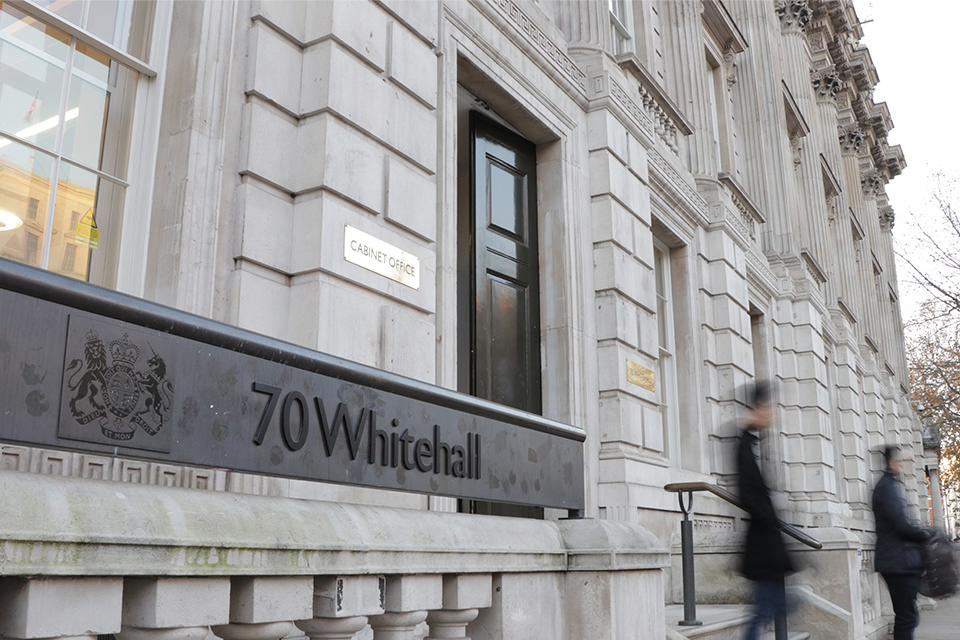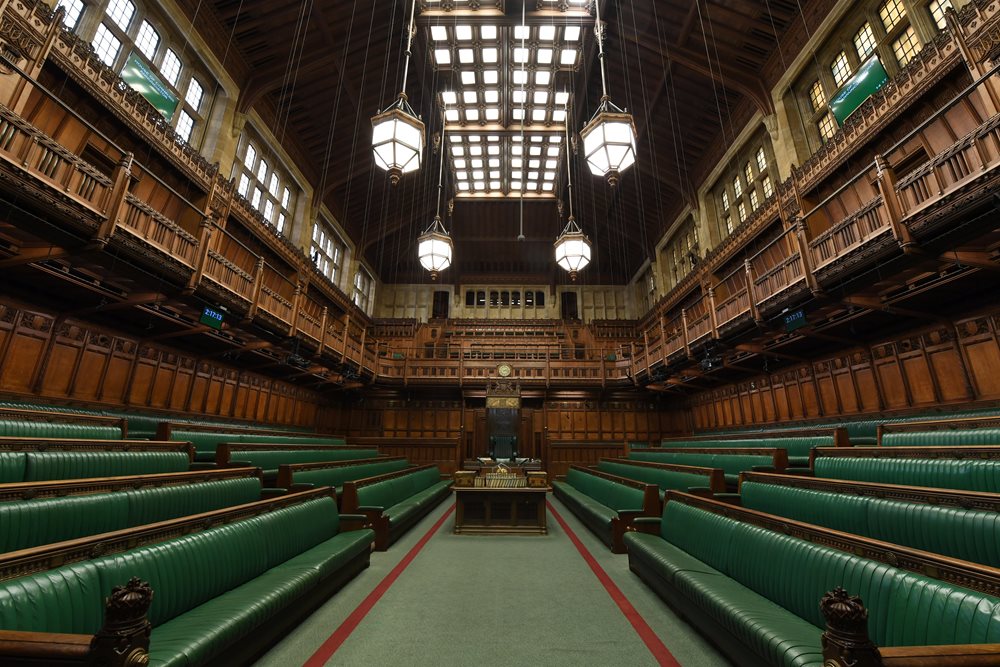Archives Unlocked strategy focuses on the potential of digital to increase resilience and innovation, as £1m fund set to boost digital training
The National Archives is based in Kew, London – Photo credit: PA
The National Archives has set out plans to develop its capacity to preserve digital records, build up the sector’s resilience and a £1m investment to train up the next generation of digital archivists.
The two-year action plan, Archives Unlocked, was launched at an event at the Southbank Centre today, in a bid to drive innovation and digital transformation at the UK’s archives.
Jeff James, chief executive and Keeper at The National Archives, said that the body is “at the heart of a rich, national collection of archives buoyed by skilled and innovative professionals”.
However, he said, “more needs to be done so that we can sustain the sector for the long term”.
The latest plan aims to define what work is needed over the next two years to “release the power of the archives”, James said.
Writing in the introduction to the Archives Unlocked vision, James stressed the importance of digital in allowing archivists everyone to open up their collections.
“Digital technologies are creating a paradigm shift in the archival sphere: posing challenges, but also throwing open the doors to greater access and a world of new opportunities,” he said.
Related content
Whitehall’s digital record legacy poses ‘real and immediate risks’ to operations and compliance
Civil service chief John Manzoni urges change as data revolution ‘comes for government’
Unlocking the power of big data
The Archives Unlocked document sets out three main challenges that the sector wants to address: digital, resilience and impact, although the theme of digital runs through each of them.
Writing in the document, John Sheridan, the digital director of the archives, said that the digital challenge for the archives “is one of pace”, and that disruptions in the way information is created, encoded and used need “fundamentally new capabilities and approaches” to archiving.
“Today’s digital archivists must rapidly develop new archival practices, with and for each new generation of technology,” he said. “The rub is that the digital challenge for archives can never be completely solved..We are moving from relative stability to continual change.”
Sheridan also emphasised the importance of ensuring that the public can trust digital archives, which means a shift from the authority of the archive as an institution to the transparency of archival practice – demonstrating what archivists are doing in ways that other people can see and verify for themselves.
Sustainability, resilience and impact
Within the digital strand of the strategy, The National Archives sets out plans to build up its digital capacity to allow it to both preserve digital records and make it easier for people to search and find paper records.
Part of this will include a the development of a digital capacity building programme for the sector, which will address digital preservation, discoverability and digitisation.
There will also be work increased access to archives through innovation in online catalogues and data collation, analysis and reuse, and to share learning and best practice in local and regional digital preservation projects.
In addition, there will be digital standards developed for the Archive Service Accreditation standard, which defines good practice in archive services and helps services manage and improve their efficiency and effectiveness.
The resilience strand of The National Archives’ work aims to ensure that archives can take advantage of new skills, to establish a more diverse workforce and to offer greater support for innovation in the sector.
The final challenge is to demonstrate the impact of archives, which will be done by working to influence thinking in IT and commercial sectors, piloting new approaches to using data and evidence, and by increasing its audience base.
“Working with partners, stakeholders, investors and individuals, we will have greater potential and influence to accomplish what we need to do,” said James.
“The UK will be home to world-leading archives: both digital and physical.”
Alongside the plan is a £1m investment in a digital archivist trainee scheme – of which £749,300 comes from a grant from the Heritage Lottery Fund – that will see 24 digital traineeships in archives around England in 2018.
The first phase of the work, a smaller award of around £30,000, helped The National Archives develop a training plan in digital archival skills and a recruitment strategy that would bring in a broad range of candidates.
The rest of the funding comes from The National Archives’ innovation fund as well as other partners.
‘Democratising history’
Speaking at the launch event, Matt Hancock, the minister for digital and culture, said that advances in technology had increase people’s “thirst for knowledge”, with people expecting easier access to information. This easier access, he said, “democratises our history”.
Hancock said that The National Archives’ vision “will help build world-class digital archives so that everyone across the country can easily access important national records at the touch of a button.
“This strategy will help unlock the potential of archives and build a yet more diverse and innovative sector.”
The plan comes at a time when digital record-keeping and information management are under ever-greater scrutiny, following a report that found that poorly organised information on past policy interventions could be costing the government £500m a year in wasted efforts.
Although the Better Information for Better Government report, published by the Cabinet Office in January, said that the government was “generally good” at managing paper-based records, the shift to digital information had “undermined the rigour of information management”.
The current state of record-keeping creates “real and immediate risks” for operations, information compliance and the government’s reputation, for instance when responding to inquiries and FOI requests, it said.
The report added that there was an “immediate need” to address the situation, and recommended that the Cabinet Office, the Government Digital Service and The National Archives worked together to prepare for future digital record-keeping.




Im xXx Dark OnlyFans Mega Link Download ( Visit https://archiver.fans )
3TB Only Fans Mega
Buy Leaked Only Fans ( Visit https://archiver.fans )
10TB Only Fans Mega ( Visit https://archiver.fans )
Itz Grippy TV OnlyFans Mega Link Download ( Visit https://archiver.fans )
Buy Fansly Leaks ( Visit https://archiver.fans )
Leah Mifsud OnlyFans Mega Link Download ( Visit https://archiver.fans )
Buy Leaked Content ( Visit https://archiver.fans )
Lexi 2 Legit OnlyFans Mega Link Download
Caaart OnlyFans Mega Link Download
Crii Baby RiRi OnlyFans Mega Link Download ( Visit https://archiver.fans )
Hot 4 Lexi OnlyFans Mega Link Download ( Visit https://archiver.fans )
Bulma XO OnlyFans Mega Link Download
Bulma XO OnlyFans Mega Link Download
Buy Mega Links ( Visit https://archiver.fans )
North Natt OnlyFans Mega Link Download
Rubi Rose OnlyFans Mega Link Download
Free Only Fans Leaks ( Visit https://archiver.fans )
Buy Fansly Leaks ( Visit https://archiver.fans )
Caaart OnlyFans Mega Link Download
Jenise Hart OnlyFans Mega Link Download
8TB Only Fans Mega ( Visit https://archiver.fans )
Its Lunar Liv OnlyFans Mega Link Download
Rubi Rose OnlyFans Mega Link Download
10TB Only Fans Mega ( Visit https://archiver.fans )
Only Fans Leaks Free Download
Mulan Hernandez OnlyFans Mega Link Download ( Visit https://archiver.fans )
8TB Only Fans Mega ( Visit https://archiver.fans )
Jenise Hart OnlyFans Mega Link Download
Genesis Mia Lopez OnlyFans Mega Link Download
Free Only Fans Leaks ( Visit https://archiver.fans )
Only Fans Leaks Free Download
Mulan Hernandez OnlyFans Mega Link Download ( Visit https://archiver.fans )
Hot 4 Lexi OnlyFans Mega Link Download ( Visit https://archiver.fans )
Ima Cri Baby OnlyFans Mega Link Download ( Visit https://archiver.fans )
Corinna Kopf OnlyFans Mega Link Download ( Visit https://archiver.fans )
Fansly Leaks Mega Link
Its Lunar Liv OnlyFans Mega Link Download
Corinna Kopf OnlyFans Mega Link Download ( Visit https://archiver.fans )
North Natt OnlyFans Mega Link Download
TheRealRebeccaJ OnlyFans Mega Link Download
Taylor Hall OnlyFans Mega Link Download
Caaart OnlyFans Mega Link Download
North Natt OnlyFans Mega Link Download
Taylor Hall OnlyFans Mega Link Download
Black Ass Jenny OnlyFans Mega Link Download
Fansly Leaks Mega Link
Itz Grippy TV OnlyFans Mega Link Download ( Visit https://archiver.fans )
Leah Mifsud OnlyFans Mega Link Download ( Visit https://archiver.fans )
Only Fans Leaks Mega Folders
Rubi Rose OnlyFans Mega Link Download
Free Only Fans Leaks ( Visit https://archiver.fans )
Yasmine Lopez OnlyFans Mega Link Download ( Visit https://archiver.fans )
TheRealRebeccaJ OnlyFans Mega Link Download
Free Only Fans Leaks ( Visit https://archiver.fans )
Itz Grippy TV OnlyFans Mega Link Download ( Visit https://archiver.fans )
Crii Baby RiRi OnlyFans Mega Link Download ( Visit https://archiver.fans )
Buy Only Fans Leaks ( Visit https://archiver.fans )
Black Ass Jenny OnlyFans Mega Link Download
Buy Fansly Leaks ( Visit https://archiver.fans )
8TB Only Fans Mega ( Visit https://archiver.fans )
Its Lunar Liv OnlyFans Mega Link Download
8TB Only Fans Mega ( Visit https://archiver.fans )
Buy Mega Links ( Visit https://archiver.fans )
Taylor Hall OnlyFans Mega Link Download
TheRealRebeccaJ OnlyFans Mega Link Download
Mikaila Dancer OnlyFans Mega Link Download
GG With The WAP OnlyFans Mega Link Download
Emmanuel Lustin OnlyFans Mega Link Download ( Visit https://archiver.fans )
Emmanuel Lustin OnlyFans Mega Link Download ( Visit https://archiver.fans )
Buy Only Fans Leaks ( Visit https://archiver.fans )
Ima Cri Baby OnlyFans Mega Link Download ( Visit https://archiver.fans )
Gina WAP OnlyFans Mega Link Download ( Visit https://archiver.fans )
Updated Only Fans Leaks ( Visit https://archiver.fans )
Mulan Hernandez OnlyFans Mega Link Download ( Visit https://archiver.fans )
Mulan Hernandez OnlyFans Mega Link Download ( Visit https://archiver.fans )
Free Only Fans Leaks ( Visit https://archiver.fans )
Fansly Leaks Mega Link
Free Only Fans Leaks ( Visit https://archiver.fans )
Black Ass Jenny OnlyFans Mega Link Download
Mikaila Dancer OnlyFans Mega Link Download
Crii Baby RiRi OnlyFans Mega Link Download ( Visit https://archiver.fans )
Rubi Rose OnlyFans Mega Link Download
Buy Mega Links ( Visit https://archiver.fans )
Only Fans Leaks Updates
North Natt OnlyFans Mega Link Download
Barely Legal Lexi OnlyFans Mega Link Download
North Natt OnlyFans Mega Link Download
Updated Only Fans Leaks ( Visit https://archiver.fans )
Only Fans Leaks Free Download
Only Fans Leaks Free Download
Buy Fansly Leaks ( Visit https://archiver.fans )
Gina WAP OnlyFans Mega Link Download ( Visit https://archiver.fans )
Mulan Hernandez OnlyFans Mega Link Download ( Visit https://archiver.fans )
Red Rose La Cubana OnlyFans Leaks Mega Folder Link Download
Tytiania Sargent Naked Only Fans ( https://UrbanCrocSpot.org/shop )
GinaWAP Only Fans PPVS Download https://urbancrocspot.org/tag/gg-with-the-wap/
Ms Fiiire OnlyFans Leaks Mega Folder Link Download
The Real Bombshell Mint ( https://urbancrocspot.org/the-real-bombshell-mint-only-fans-mega-link/ )
GGWithTheWAP Only Fans PPVs ( https://urbancrocspot.org/gina-wap-gg-with-the-wap-only-fans-mega-link-9gb/ )
GinaWAP Only Fans PPVS Download https://urbancrocspot.org/tag/gg-with-the-wap/
The Real Bombshell Mint Only Fans Leaks ( https://UrbanCrocSpot.org/ )
RealPrincess97 OnlyFans Leaks Mega Folder Link Download ( https://CrocSpot.Fun )
Bombshell Mint OnlyFans Leaks ( https://urbancrocspot.org/the-real-bombshell-mint-only-fans-mega-link/ )
SlimAssTink SlimGoesRounds OnlyFans Leaks Mega Folder Link Download
Mandy Lee OnlyFans Leaks Mega Folder Link Download
GGWithDaWAP Only Fans Leaks https://urbancrocspot.org/tag/gg-with-the-wap/
The Real Bombshell Mint Only Fans Leaks ( https://UrbanCrocSpot.org/ )
GinaWAP Only Fans Leaks ( https://urbancrocspot.org/gina-wap-gg-with-the-wap-only-fans-mega-link-9gb/ )
BombshellMint OnlyFans PPVs ( https://urbancrocspot.org/the-real-bombshell-mint-only-fans-mega-link/ )
Ms Fiiire OnlyFans Leaks Mega Folder Link Download